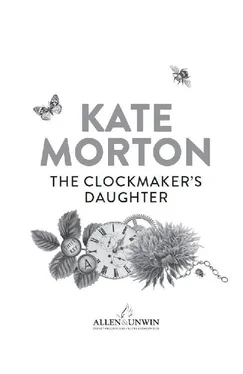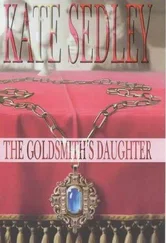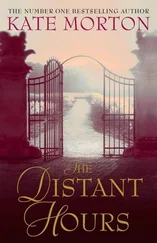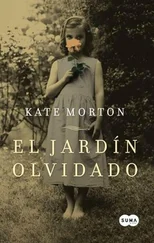Kate Morton - The Clockmaker's Daughter
Здесь есть возможность читать онлайн «Kate Morton - The Clockmaker's Daughter» весь текст электронной книги совершенно бесплатно (целиком полную версию без сокращений). В некоторых случаях можно слушать аудио, скачать через торрент в формате fb2 и присутствует краткое содержание. Год выпуска: 2018, Издательство: Allen & Unwin, Жанр: Старинная литература, на английском языке. Описание произведения, (предисловие) а так же отзывы посетителей доступны на портале библиотеки ЛибКат.
- Название:The Clockmaker's Daughter
- Автор:
- Издательство:Allen & Unwin
- Жанр:
- Год:2018
- ISBN:нет данных
- Рейтинг книги:4 / 5. Голосов: 1
-
Избранное:Добавить в избранное
- Отзывы:
-
Ваша оценка:
- 80
- 1
- 2
- 3
- 4
- 5
The Clockmaker's Daughter: краткое содержание, описание и аннотация
Предлагаем к чтению аннотацию, описание, краткое содержание или предисловие (зависит от того, что написал сам автор книги «The Clockmaker's Daughter»). Если вы не нашли необходимую информацию о книге — напишите в комментариях, мы постараемся отыскать её.
The Clockmaker's Daughter — читать онлайн бесплатно полную книгу (весь текст) целиком
Ниже представлен текст книги, разбитый по страницам. Система сохранения места последней прочитанной страницы, позволяет с удобством читать онлайн бесплатно книгу «The Clockmaker's Daughter», без необходимости каждый раз заново искать на чём Вы остановились. Поставьте закладку, и сможете в любой момент перейти на страницу, на которой закончили чтение.
Интервал:
Закладка:
‘Triple lead-lined?’ he’d said, scratching the thatch of hair beneath his tattered black top hat. ‘You’ll not be wanting all that, surely? Not for an infant’s coffin.’
‘I said nothing about an infant, Mr Middleton, and I did not ask for your opinion. I have told you my requirements; if you are unable to meet them, I shall take my business elsewhere.’
He held up his pinkish, soft-looking hands, and said, ‘It’s your coin. If you want triple lead-lined, then that’s what you’ll have, Miss … ?’
‘Millington. Miss L. Millington.’
It was a brazen choice, and an unusual nod to sentiment. But she could hardly give her real name. Besides, Edward was dead and it had been twenty years since Fanny was shot. No one else was looking for Lily Millington, not any more.
When he’d finished writing down the details, Lucy had him read them back to her. Satisfied, she asked him to draw up an account so that she could make a payment.
‘Will you be requiring a cortège? Some mutes?’
Lucy told him that she would not.
The small coffin, when it arrived at Birchwood Manor, was brought grudgingly by a railway porter who struggled to lift it from the cart. It had been packed in a wooden travel crate and there was no outward indication of what it was that he was delivering; the man was maladroit enough to ask. ‘A bird bath,’ Lucy told him. ‘Marble, I’m afraid.’ Generous gratuity was paid, after which the man’s spirit improved considerably. He even agreed to move it closer to its intended position, the garden bed to the side of the front gate. It was where Lily Millington had been standing on the day that Lucy, looking for Edward to tell him about the secret hideaways, had found Lily instead on her way to post a letter. ‘I want to be able to see it from as many windows as possible,’ Lucy told the railway porter, even though this time she had been asked no question.
When he had gone, she opened the travel crate to inspect its contents. Her first impressions were that Mr Rich Middleton of Duke Street, Chelsea, had done a very good job. Lead was essential. Lucy had no way of knowing how long the box would remain hidden, but having spent her life reading obsessively about the treasures of the past, she knew that lead did not corrode. She wanted to hide things, certainly; she hoped that they would remain concealed for a very long time; but she could not bring herself to destroy them. To that end, Lucy had specified that the lid must seal securely. Too often, archaeologists uncovered pots that had survived the ages, only to open them and find that the contents within had perished. She did not want air or water finding their way inside. The coffin must not leak or rust, and it must not crack over time. For it would be found one day, of that she was certain.
Lucy spent the next few hours digging. She’d found a shovel in the field barn and carried it up to the front garden. Her muscles ached, unaccustomed to the repetitive motion, and she had to stop every so often to rest. She realised, though, that stopping only made it harder to start again, and forced herself to push on until the cavity was deep enough.
At last it was time to fill the coffin. First, Lucy enclosed the copy of Daemonologie , which contained the letter by Nicholas Owen and the plans for Birchwood Manor explaining the priest holes. She had climbed into the attic and been glad to find the box of costumes where they’d left it. The white dress that Lily Millington had been wearing when she modelled for Edward was still amongst them, and Lucy had wrapped the bones from the priest hole carefully within it; now, she set the bundle gently inside the box. Twenty years had not left much behind.
Last, but not least, she put in a letter that she had written (cotton paper, non-acidic), outlining what she knew of the woman whose mortal remains now lay inside the coffin. It had not been easy to learn the truth, but finding information about the past was what Lucy did best, and she was not the kind of person to give up an enquiry. She had needed to rely on almost everything that Lily Millington had told her, and everything that Edward had reported, and the details that came back over time from what the man, Martin, had said that afternoon at Birchwood Manor.
Bit by bit, she had put the story together: the house above the bird shop on Little White Lion Street, the pair of rooms in the shadow of St Anne’s, the early years spent by the river; slipping back across time to the birth of a baby girl in June 1844, to a woman named Antonia, the eldest daughter of Lord Albert Stanley, and a man called Peter Bell. A clockmaker, who had lived at number forty-three Wheatsheaf Lane, Fulham.
Lucy sealed the lid just as the sun was starting to slip behind the gables. She realised that she was weeping. For Edward and for Lily; for herself, too, and the guilt from which she would never be free.
The porter had been right – the coffin was very heavy – but years spent in nature had made Lucy strong. She was also determined, and so she managed to heave the box into the ground. She filled in the dirt and patted it down hard on top.
Any latent religious inclinations that Mr Darwin had not killed, Lucy’s life experience had vanquished, and so she did not say a prayer over the fresh grave. Nonetheless, the moment called for ceremony and she had given much thought as to how she might best mark the spot.
She was going to plant a Japanese maple tree on top. She had already procured it, a lovely sapling with pale bark and the most elegant limbs, long and even, fine but strong. It had been one of Edward’s favourite trees, the leaves were red in spring, turning by autumn to a most beautiful bright copper colour, just like Lily Millington’s hair. No, not Lily Millington, she corrected herself, for that had never been her real name.
‘Albertine,’ Lucy whispered, thinking back to that mild Hampstead afternoon when she had seen the shock of red in the glass house at the bottom of the garden and Mother had instructed her to take two cups of tea ‘in the finest china’. ‘Your name was Albertine Bell.’
Birdie, to those who loved her.
Lucy’s attention was on the patch of flattened dirt in the garden bed by the front gate, so she did not notice; but by some strange trick of the dusk, just as she spoke the words, the attic window seemed ever so briefly to glow. Almost as if a lamp had been switched on inside.
XI
I told you. I do not understand the physics of it and there is no one here to ask.
Somehow, without understanding how or why, I was out of the hideaway and in the house again. Moving amongst them as before, and yet nothing like before.
How many days passed? I do not know. Two or three. They were no longer sleeping here when I returned.
The bedrooms were deserted at night, and during the day one or another would arrive to fetch an item of clothing or some other personal effect.
Fanny was dead. I heard the policemen talking about ‘poor Miss Brown’, which explained the gunshot but not the thump.
I heard them speaking, too, of the Radcliffe Blue and the tickets to America.
The policemen also spoke of me. They collected everything they could pertaining to me. To Lily Millington.
When I realised what they believed, I was aghast.
What did Edward think? Had he been told the same theory? Did he accept it?
When he finally came back to the house, he was pale and distracted. He stood at the desk in the Mulberry Room, staring out towards the river, turning to gaze sometimes at my clock, the minutes sliding by. He ate nothing. He slept not at all.
He did not open his sketchbook and seemed to have lost all interest in his work.
I stayed with him. I trailed him wherever he went. I cried, I shouted, I begged and pleaded, I lay down beside him and tried to tell him where I was; but my abilities in that area have grown with time. Back then, in the beginning, it just exhausted me.
Читать дальшеИнтервал:
Закладка:
Похожие книги на «The Clockmaker's Daughter»
Представляем Вашему вниманию похожие книги на «The Clockmaker's Daughter» списком для выбора. Мы отобрали схожую по названию и смыслу литературу в надежде предоставить читателям больше вариантов отыскать новые, интересные, ещё непрочитанные произведения.
Обсуждение, отзывы о книге «The Clockmaker's Daughter» и просто собственные мнения читателей. Оставьте ваши комментарии, напишите, что Вы думаете о произведении, его смысле или главных героях. Укажите что конкретно понравилось, а что нет, и почему Вы так считаете.












